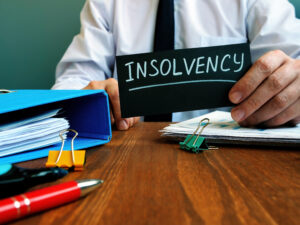“What’s the difference between insolvency and bankruptcy?” is a question we’re commonly asked by clients with businesses that are in financial distress.
The short answer is…
‘Insolvent’ is the terminology used for a limited company, sole trader, partnership or individual that cannot pay its debts on time or in full, now or in the future.
‘Bankruptcy’ is a resolution to insolvency for an individual, whether their debts are from an unincorporated business (sole trader or partnership) or are non-business personal liabilities.
Someone that is bankrupt is insolvent but being insolvent doesn’t necessarily mean you enter bankruptcy.
In this article, we go into more detail to explain these commonly used terms and show you how to solve the financial issues they bring.
What is insolvency?
When you are insolvent you can no longer pay your debts when they are due. The term insolvent most often refers to a business but either an individual or a business can be insolvent.
A business can become insolvent in two ways, either separately or together:
Cashflow insolvent – the business does not have enough available cash to pay its debts but may have illiquid assets.
Balance Sheet insolvent – company debts are greater than total assets.
What are your options?
There are ways to remedy this. Often by looking at the source of your trouble – such as increased competition in the marketplace, changes in consumer behaviour or poorly managed cash flow – we can tackle the issue from the roots and eliminate the problem.
In some cases, we can use a procedure like a Company Voluntary Arrangement (CVA) to arrange for the manageable repayment of the debts with your creditors, so that you have breathing space to get back on track.
Depending on your unique circumstances, it might be that you need to use an Administration or Liquidation to rid yourself of debt and restart your business with a clean slate. As with all insolvency processes, these both require the services of a licensed insolvency practitioner.
What is bankruptcy?
As we have said above, a limited company cannot be bankrupt. A sole trader or an individual in a partnership can be, as they are personally liable for their business’ debts.
Bankruptcy is a legal process undertaken when an individual can no longer pay off their debts and has no prospect of doing so.
There are alternatives to bankruptcy.
What are your options?
If you owe £30,000 or less on credit cards, loans, overdrafts, rent or bills, and have less than £75 spare income a month, you can apply for a Debt Relief Order, via a licensed insolvency practitioner. Once the Debt Relief Order is approved, you’ll be protected from them taking legal action. At the end of the Debt Relief Order, the debts listed on the order will be written off.
An Individual Voluntary Arrangement (IVA) is similar to a CVA, which we detailed above. It’s a formal agreement between you and your creditors that states new terms for the repayment of your debts. An IVA will give you breathing space to create a plan to get out of debt completely. It’s often used for sole traders or partnerships who find themselves in an insolvent position.
These options are both preferable to bankruptcy as they are both tailored to your personal circumstances and do not require you to sell your personal assets to pay back your debts.
Can you avoid insolvency or bankruptcy?
The best way to avoid insolvency is to look at your current challenges and create a sound plan for your business or personal finances. Whether you’re a business, individual, sole trader or partnership, an up-to-date and accurate cash-flow forecast will help you to stay on top of your outgoings and incoming funds so that you don’t get caught by surprise.
Read more:
The difference between insolvency and bankruptcy, explained.



























